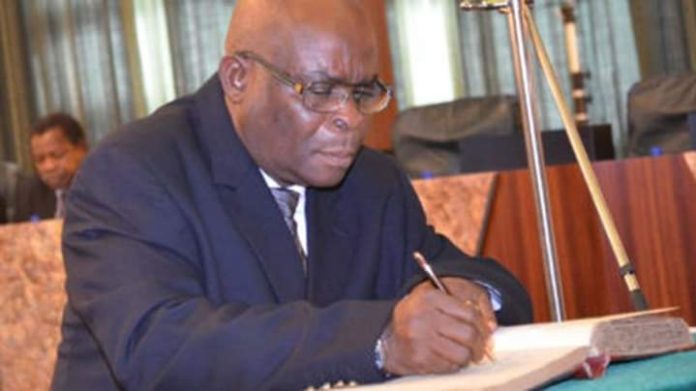On Tuesday, August 20, 2024, at the Court of Appeal in Abuja, Justice Walter Onnoghen, the former Chief Justice of Nigeria (CJN), will reopen his legal challenge to the ruling of the Code of Conduct Tribunal (CCT) that ordered his dismissal from office in 2019.
Since April 2019, the lawsuit has been pending before the Court of Appeal.
On a number of grounds, the former head of Nigeria’s judiciary is pleading with the Court of Appeal to nullify and set aside the decision rendered against him by the CCT on April 18, 2019.
In his appeal marked CA/ABJ/375 & 376 & 377/2019, Justice Onnoghen through his lead counsel, Adegboyega Awomolo, SAN, is asking the appellate court to quash his conviction primarily on ground of want of jurisdiction, bias and and absence of fair hearing.
The Federal Republic of Nigeria is the only respondent, with Onnoghen acting as the appellant.
The notice for hearing on the appeal, “CA/ABJ/375 & 376 & 377/2019 BTW: Justice Onnoghen and FRN,” was just spotted by news reporters.
“Please take notice that the above matter is scheduled for hearing in Court Appeal, Abuja Division on Tuesday, August 20, 2024, at 9:00 a.m.,” the notice stated.
“Please take note that this serves as a hearing notice”.
In 2019, the Code of Conduct Tribunal found Onnoghen guilty on all six counts of violating the Code of Conduct for Public Officers, which were brought against him by the federal government during his tenure as the nation’s chief justice.
Danladi Yakubu Umar, the chairman of the CCT, has ordered Onnoghen’s immediate dismissal from his position as the CJN in his lead decision.
Additionally, the Tribunal had stripped him of all positions he had held in the past, including the chairmanships of the Federal Judicial Service Commission and the National Judicial Council, NJC.
In addition, the tribunal ruled that Onnoghen’s five bank accounts and the funds within them that he failed to disclose on the asset declaration form he filed to the federal agency Code of Conduct Bureau, or CCB, would be forfeited.
Despite the fact that Onnoghen had resigned on April 4 and had been placed on suspension since January 25, 2019, the panel nevertheless ordered his removal from his positions as the Chief Justice of Nigeria and the chairman of the Federal Judicial Service Commission and the National Judicial Council.
But, unsatisfied with the CCT ruling, Onnoghen petitioned the Court of Appeal in Abuja in 2019 citing sixteen reasons to overturn the Tribunal’s conviction of him.
Among other things, he contended that the CCT panel headed by Danladi Umar committed a legal error and caused a miscarriage of justice against him by refusing to dismiss the six-count against him.
He argued that the Chairman of the CCT should not have been allowed to oversee his trial.
In his seven-point reliefs, Onnoghen requested that his conviction be overturned, that the order requiring the confiscation of his assets be quashed, and that he be cleared of all accusations brought against him.
Onnoghen contended that he was a judicial officer at the time the accusations were filed against him on January 11, 2019, and as such, he cannot be subject to the jurisdiction of the lower tribunal. He listed some of the specific errors in the CCT’s ruling.
“0n the authority of Nganiiwa v. FRN (2018) 4 NWLR (Pt. 1609) 30: at 340. 341 only the National Judicial Council (NJC) has the power to discipline the Appellant for misconduct and not the lower tribunal.
“The lower tribunal had in the case of FRN V. Sylvester Nwali Nguta in charge No: CCT/ABJ/01/2017 delivered on 9th January, 2018, affirmed the position of the Court in FRN Nganjiwa v. FRN and dismissed the charges and acquitted and discharged Justice Ngwuta being a Judicial Officer subject only to the discipline of the National Judicial C0uncil.
“The lower tribunal has no iurisdittion over servng judicial officers such as the appellant, save the National Judicial Council.
“The Motion on Notice dated 14th January, 2019, challenging iurisdiction ought to be granted in all material particular as it purports to save the lower tribunal of needless futile exercise.
“The lower tribunal erred In law when it dismissed the Appellant’s Application seeking the chairman to recuse himself from further proceedings on the ground of real likelihood of bias and thus occasioned a miscarriage of justice.
“The Appellant has alleged that the chairman of the lower tribunal is biased towards him as a result of open remarks in the tribunal as well as the manner in which the proceedings was being conducted.”
In contrast to the CCT’s conclusion, Onnoghen claimed he did not acknowledge not declaring his assets when serving as a Supreme Court justice in 2005. He went on to say that he just forgot to make the compulsory statement in 2009.
In opposition to the terms of paragraph three of section 23 of the CCB Act, which only enables the seizure of such assets “if they were acquired by fraud,” Onnoghen contested the order for the confiscation of his assets on the grounds that they were lawfully acquired.
He took issue with the prosecution’s failure to bring petitioner Denis Aghanya before the tribunal that heard his case and brought charges against him.
According to Onnoghen, none of the accusations made against him “constitute an offense and should not have served as the foundation for his conviction.”
The former Chief Justice of Nigeria requested that the Court of Appeal issue many orders against the ruling of the CCT. These orders included the claims that the tribunal did not have the authority to hear the case and that its chairman should have withdrawn from the proceedings.
Consequently, Onnoghen filed an application to be cleared of all allegations and to have his conviction overturned, as well as to have the Tribunal’s ruling forfeiting his assets set aside.
